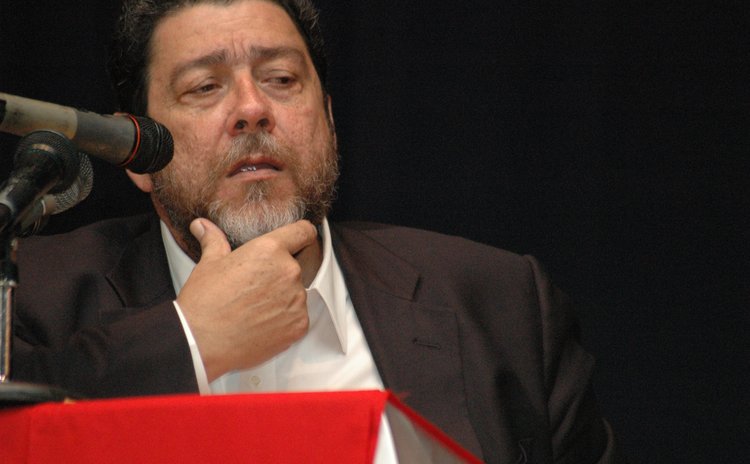OECS Central Bank makes major moves

On life support for decades, the economy of the islands of the Eastern Caribbean has been taken to the operation theatre. Like surgeons, OECS Finance Ministers say they have decided to cut, stitch and pump new blood into the financial sector to create more jobs and revive the economy of the sub-region.
"In our last meeting on February 24, 2015, the Monetary Council made several vital decisions and I wish to take this opportunity to inform you of these decisions", said Dr. Ralph Gonsalves, the Chairman of the Eastern Caribbean Central Bank (ECCB) Monetary Council in a statement that he named "Strengthening our Currency Union and Securing our Future".
Dr. Gonsalves, who's also the Prime Minister of St. Vincent and the Grenadines, spoke on radio and television stations of the Organisation of Eastern Caribbean States (OECS) last night.
He told his audience that the economy of the OECS grew by an average of 1.1 percent in 2013; 1.3 percent in 2014 and the sub-region's economy was projected to grow by 1.4 percent in 2015.
Nevertheless, Gonsalves said: "Our economies continue to face challenges to sustainable growth, fiscal and debt sustainability and financial stability. The Monetary Council desires to see faster economic recovery and stronger job creation."
Among the main decisions taken by the Monetary Council to achieve that objective was a lowering of the Minimum Savings Deposit Rate from 3.0 per cent to 2.0 per cent. By reducing that rate the Council hopes banks will cut their costs and reciprocate by providing more credit on better terms to customers.
"Our banking system has a lot of money - excess liquidity, yet credit to the private sector (new loans) is declining," the Chairman of the Monetary Council, the highest decision-making body of the ECCB, said. "Last year, despite the fact that the banks had excess liquidity, credit declined by 4.5 per cent. Declining credit to the private sector makes economic recovery slower. This situation has to change".
Gonsalves added: "At the same time, non-performing loans in the banking system are very high and average 18.8 per cent across the ECCU, largely because of the difficult economic situation in many of our countries. High non-performing loans make our banks less willing to lend and weaken our economies. This situation must change.
"There are too many potentially good businesses struggling to secure working capital and struggling to survive. Some of these businesses are paying very high interest rates on loans from our commercial banks. As a consequence of the lower deposit rate, we anticipate a lowering of interest rate spreads. More importantly, we expect to see businesses pay lower interest rates on loans provided by our commercial banks. We are especially keen to see lower interest rates for all export-oriented firms. We would also like to see interest rates on mortgages continue to fall so that more of our people can afford to own a home".
The new deposit rate will take effect from 1 May 2015, Dr. Gonsalves said.
Additional measures
Dr. Gonsalves said the Monetary Council also decided to "strengthening the resilience of the financial system" in the currency union and to offer "full protection of all depositors". That decision is a response to significant declines in profitability and performance of a number of OECS banks, resulting in the closure of a number of branches.
"The ECCB intervened one bank in Antigua and Barbuda and two banks in Anguilla to protect the interests of depositors and creditors and to maintain financial stability," Dr. Gonsalves stated.
As part of the strategy to regulate and strengthen the banking sector, Dr. Gonsalves said the Council has asked member governments to pass a Bill to provide for: the issuance and revocation of licenses by the Central Bank rather than the respective Ministers of Finance; pre-emptive measures to deal with problem banks; appropriate levels of capitalization for banks and credit institutions; and clear criteria for the persons who can be appointed as directors and managers of banks.
Additionally, the Council has approved an amendment to the 1983 ECCB Agreement Act to give more power to the ECCB.
Two entities are also to be established: a Deposit Insurance Fund and an Eastern Caribbean Asset Management Corporation.
"The measures that we have taken are to ensure that your deposits are safe," Dr. Gonsalves assured the OECS public.
One of the major decisions the ECCB Council took at its February 24, 2015 meeting was the extension of the timetable to reduce the sub-region's Debt/GDP Ratio to 60 per cent from 2020 to 2030.
"Why have we done so?" asked Dr. Gonsalves. "Attaining this target by 2020, required prudent debt management and continuous economic growth at a level sufficient to meet the target. Unfortunately, there has been little or no growth in the ECCU for most of the past five years".
It will probably take a few years before the OECS declares that all this cutting and stitching and pumping of new blood into the financial sector by the ECCB has paid dividends.
But Dr. Gonsalves is confident that "working together and with the help of Almighty God, we are bound to succeed".




